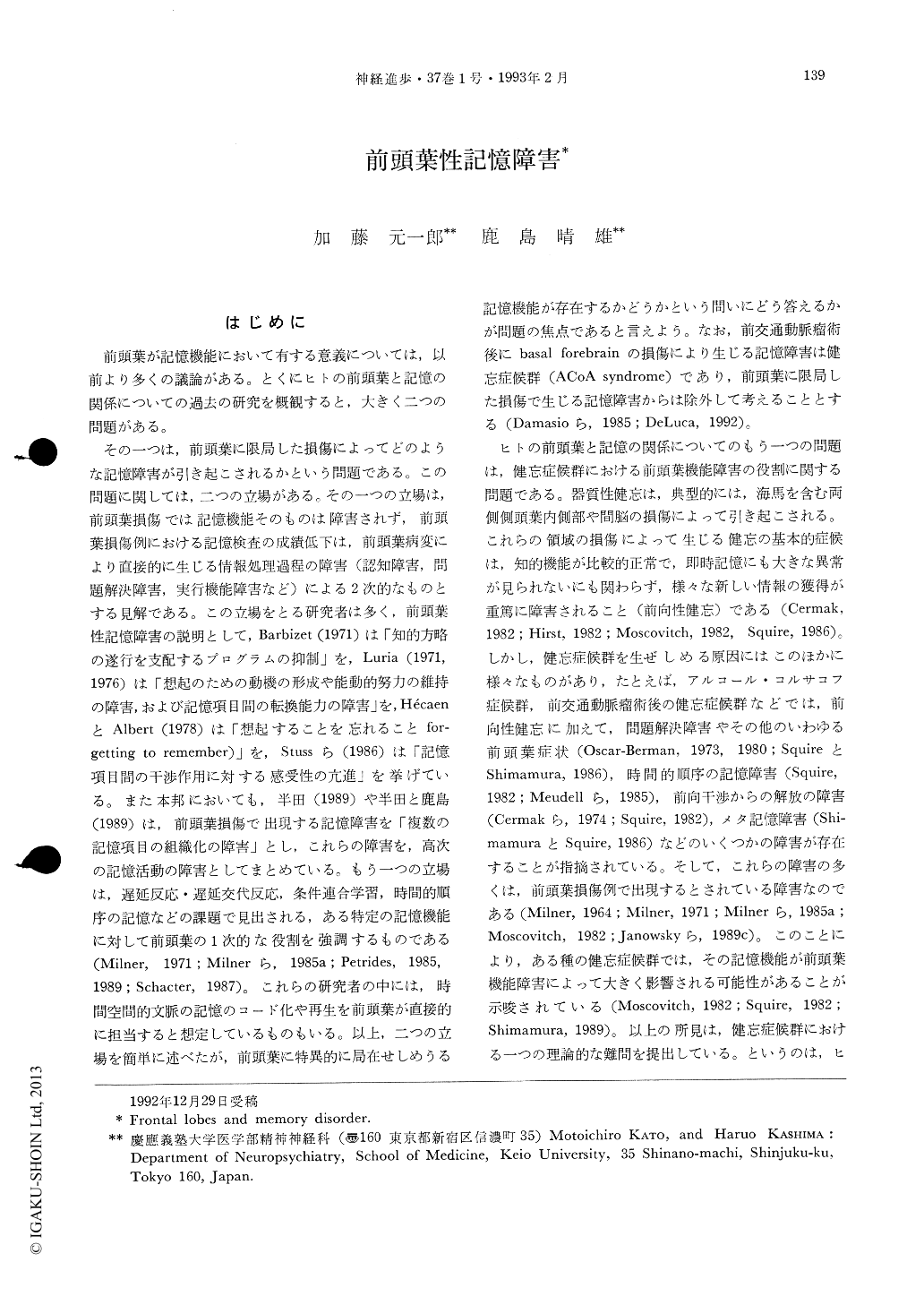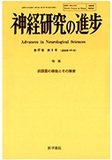Japanese
English
- 有料閲覧
- Abstract 文献概要
- 1ページ目 Look Inside
はじめに
前頭葉が記憶機能において有する意義については,以前より多くの議論がある。とくにヒトの前頭葉と記憶の関係についての過去の研究を概観すると,大きく二つの問題がある。
その一つは,前頭葉に限局した損傷によってどのような記憶障害が引き起こされるかという問題である。この問題に関しては,二つの立場がある。その一つの立場は,前頭葉損傷では記憶機能そのものは障害されず,前頭葉損傷例における記憶検査の成績低下は,前頭葉病変により直接的に生じる情報処理過程の障害(認知障害,問題解決障害,実行機能障害など)による2次的なものとする見解である。この立場をとる研究者は多く,前頭葉性記憶障害の説明として,Barbizet(1971)は「知的方略の遂行を支配するプログラムの抑制」を,Luria(1971,1976)は「想起のための動機の形成や能動的努力の維持の障害,および記憶項目間の転換能力の障害」を,HecaenとAlbert(1978)は「想起することを忘れることforgetting to remember)」を,Stussら(1986)は「記億項目間の干渉作用に対する感受性の亢進」を挙げている。また本邦においても,半田(1989)や半田と鹿島(1989)は,前頭葉損傷で出現する記憶障害を「複数の記憶項目の組織化の障害」とし,これらの障害を,高次の記憶活動の障害としてまとめている。もう一つの立場は,遅延反応・遅延交代反応,条件連合学習,時間的順序の記憶などの課題で見出される,ある特定の記憶機能に対して前頭葉の1次的な役割を強調するものである(Milner,1971;Milnerら,1985a;Petrides,1985,1989;Schacter,1987)。これらの研究者の中には,時間空間的文脈の記憶のコード化や再生を前頭葉が直接的に担当すると想定しているものもいる。以上,二つの立場を簡単に述べたが,前頭葉に特異的に局在せしめうる記憶機能が存在するかどうかという問いにどう答えるかが問題の焦点であると言えよう。なお,前交通動脈瘤術後にbasal forebrainの損傷により生じる記憶障害は健忘症候群(ACoA syndrome)であり,前頭葉に限局した損傷で生じる記憶障害からは除外して考えることとする(Damasioら,1985;DeLuca,1992)。
There are two major domains in the neuropsychological investigations of the relationship between the frontal lobe and memory functions.
The first domain is involved in memory disorder which appears in the circumscribed lesions of frontal lobes. It has been suggested that memory functions per se are not disturbed after frontal lobe damage. From this point of view, the poor performances on memory tests in the patients with frontal lesions are secondary to disturbances of information processing, such as executive dysfunction, problem solving disorder, disinhibition, and interference, which are directly caused by frontal lesions (Barbizet, 1971; Luria, 1976; Stuss and Benson, 1986; Handa, 1989). Some studies, however, have emphasized that the frontal lobes play the primary role on the poor results of some memory tasks such as delayed response, conditioned associative learning, and temporal discrimination task (Jacobsen, 1935; Petrides, 1989; Milner, 1971; Schacter, 1987). In particular, Milner (1991) supported that the left-lateral fron-tal cortex had a functional role in verbal recency judgments. However, Handa (1989) and Handa & Kashima (1989) gave a critical report to this hypothesis by devising a new task which were similar to the Milner's recency test in test structure, but which did not request to discriminate the temporal order but required to judge the difference of locations of two stimuli. They showed that the patients with frontal lesions also had a significant poor performance than controls on this task as well as on the recency discrimination task. Schacter (1989) emphasized that encoding of spatiotemporal information in humans can be accomplished relatively automatically and insisted that frontal amnesia should not be viewed as nonspecific effects which result from general failures of motivation or strategic processing. The problem of the primary role of frontal lobes on memory functions is still controversial and remains unsolved. However, it is suggested that the memory tasks on which the patients with frontal lesions have poor performances are characterized by stimuli being given in the sequential manner.

Copyright © 1993, Igaku-Shoin Ltd. All rights reserved.


